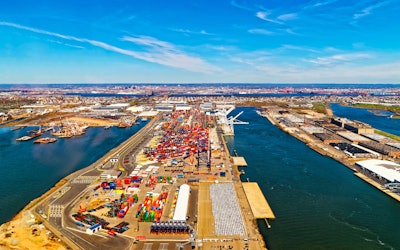
The International Longshoremen's Association and the U.S. Maritime Alliance (USMX) Thursday night reached a tentative agreement to reopen all East and Gulf Coast ports without reaching a new long-term deal.
The largest longshoremen’s union in North America is pushing the USMX for higher wages and a ban on automation technologies that guide cranes, gates and the movement of containers. USMX filed an “unfair labor practice” charge against the ILA as talks broke down last week.
The two sides agreed Thursday night to extend their existing contract until Jan. 15, 2025, and to return to the bargaining table to negotiate all other outstanding issues. "Effective immediately, all current job actions will cease and all work covered by the master contract will resume," the union said via statement.
The White House Thursday night released a statement applauding all involved for their efforts to restart work at the ports, adding the temporary agreement "indicates progress toward a strong contract and represents the power of collective bargaining. As I have said, this is about fairness – and our economy works best when workers share in record profits. Dockworkers deserve a fair share for their hard work getting essential goods out to communities across America."

The strike ends after just more than two days at three dozen facilities across 14 port authorities that handle more than 40% of all U.S. imports stretching from Maine to Texas.
"We are glad to see the strike has ended, but it should have never happened in the first place," said American Trucking Associations President and CEO Chris Spear, fuming that the White House consistently declined to step in. "This is a deal that could have been cut months ago had both parties stayed at the table. That was the job of this Administration, which it refused to do. This failure was not without cost, impacting real Americans, including millions reeling from a natural disaster."
The National Association of Manufacturers (NAM) estimated the strike jeopardizes $2.1 billion in trade daily, and the total economic damage could reduce GDP by as much as $5 billion per day. In the end, the economic impact of a work stoppage that lasted less than 72 hours should be minimal as many shippers had been front loading for several months in anticipation of a strike, and trucking fleets had been making adjustments.










